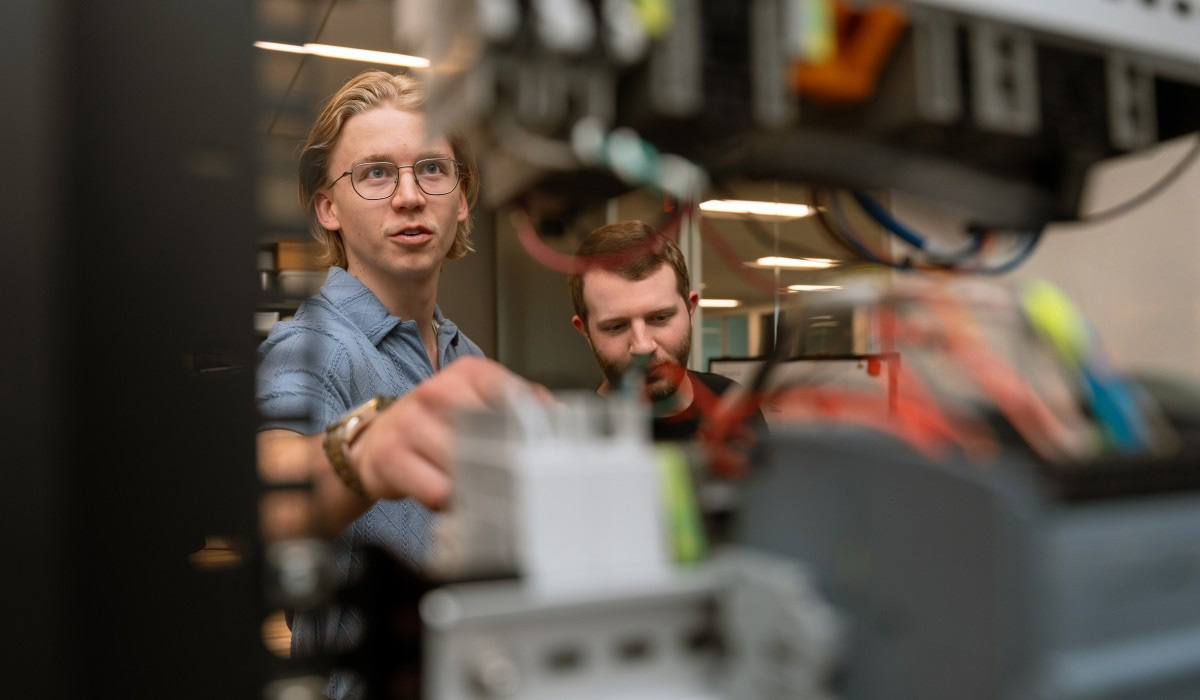Online Master of Science in Technology – Management of Technology
In this program, you’ll develop a foundation in product development, technology operations and business strategy with an innovative mindset. You’ll move on to build upon this foundation and your current skills, preparing you to transition from a technical role into leadership. This type of career advancement could look like pursuing a management position in modern high-tech environments or launching your own ventures.
Your studies will cover technology strategy, entrepreneurship, data-driven decision-making and disruptive innovation management from a leadership perspective. With an additional emphasis on augmented and artificial reality, the program cultivates learning experiences that focus on applied generative AI, AI algorithms and models, and prompt engineering and narrow AI tool training. You’ll develop skills using AI to advance project, product and operations management — gaining experience with cutting-edge tools shaping the future of technology.
Why get your master's in technology management?
The nature of work is rapidly evolving, and this program equips you with the skills and knowledge to lead technological advancement and business transformation. You’ll develop into a leader who’s equipped to guide enterprises through innovation, manage new technologies, and create strategies that improve efficiency, sustain growth and drive successful business outcomes in fast-changing industries. If you thrive in an innovative setting and are ready to take the next step professionally, earning this master’s degree can position you to make an impact in an organization and your career.
Deciding if this program is right for you
This management of technology program is ideal for current engineers, scientists, IT professionals and others in tech-related roles who want to deepen their experience, push the boundaries of innovation and define the next era of technology in business, whether you grow into an executive or turn ideas into business models. You’ll be set up for success if you have technical training in engineering, biotechnology, software or computer science, graphic information technology or IT; a degree in any of these fields or a STEM-related area is required. The opportunity to work on hands-on projects, case studies and applied research addressing real-world challenges will also provide you with experience for in-demand leadership positions.

Prepare to lead at the intersection of technology and business with an online Master of Science Management of Technology from Arizona State University. Designed for professionals in technical positions who want to advance, this interdisciplinary program will shape you into a leader who can manage emerging technologies, drive innovation and guide organizations through change. Upon graduation, you can be an innovative leader that society and organizations need today to thrive and stay competitive.
Courses are designed to equip you with the abilities to oversee a wide array of tech areas — from new product development and strategic tech management to disruptive innovation and technological evolution. To align your studies with your career goals, you can customize your learning experience by choosing electives in areas such as data science, sustainability, social innovation and logistics. The program culminates with a portfolio or applied project that supports your career direction and showcases your projects and accomplishments to employers.
Of the 350+ faculty members in Ira A. Fulton Schools of Engineering, the majority have been honored with the highest awards in their fields. Faculty milestones include:
- National Academy of Construction members
- National Academy of Engineering members
- National Academy of Inventors members
- National Academy of Sciences member
The Ira A. Fulton Schools of Engineering is dedicated to providing a dynamic learning environment and supporting all students on the paths to their degrees. We’ve received numerous peer-reviewed programmatic honors from U.S. News & World Report.
best online master’s in electrical engineering programs
best online master’s in engineering management programs
for bachelor’s degrees awarded to underrepresented minorities (American Society for Engineering Education, 2022)
best online master’s in engineering programs for veterans
best online master's in industrial engineering programs
best online master’s in engineering programs
best undergraduate electrical, electronic and communications engineering programs
best undergraduate engineering programs
Applicants for this online management of technology program must fulfill the requirements of both the Graduate College and the Ira A. Fulton Schools of Engineering.
Applicants with grades below the minimum level may be considered for provisional admission if there is strong evidence suggesting the potential for outstanding performance in the Polytechnic School graduate program. In certain cases, demonstrated aptitude through professional technical experience or additional post-baccalaureate education may also be considered.
Applicants must have earned a bachelor's or master's degree in engineering, engineering technology, hard science, mathematics, computer science or a related field from a regionally accredited institution.
Applicants must have a minimum cumulative GPA of 3.00 (scale is 4.00 = "A") in the last 60 hours of their first bachelor's degree program or a minimum cumulative GPA of 3.00 (scale is 4.00 = "A") in an applicable master's degree program.
All applicants must submit:
- Graduate admission application and application fee
- Official transcripts
- Personal statement
- Up-to-date curriculum vitae or resume
An applicant whose native language is not English (regardless of current residency) must provide proof of English proficiency.
Neither GRE nor GMAT scores are required for admission.
No, Arizona State University’s diplomas don’t specify whether you earn your degree online or in person. All diplomas and transcripts simply say “Arizona State University.”


















